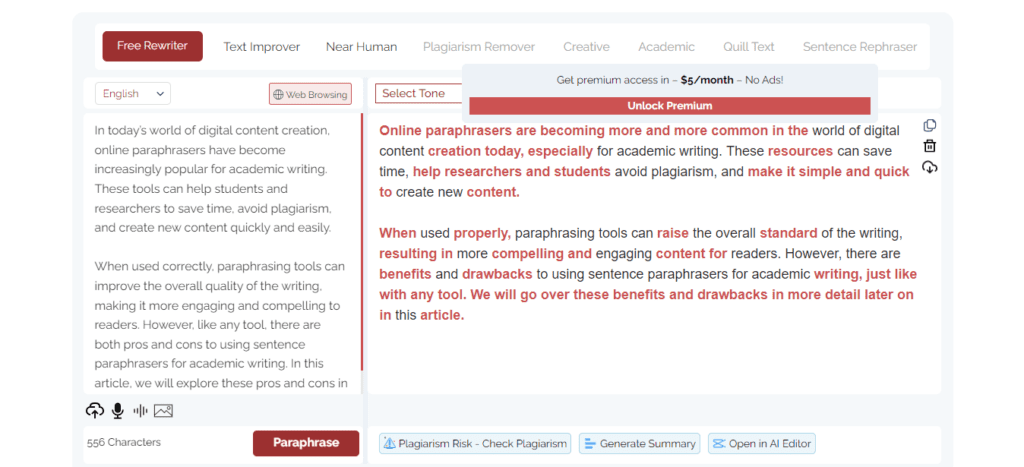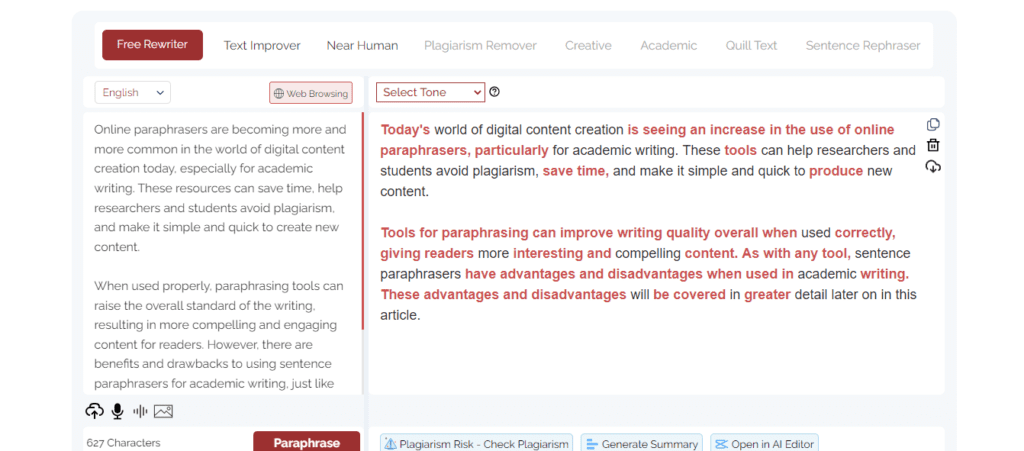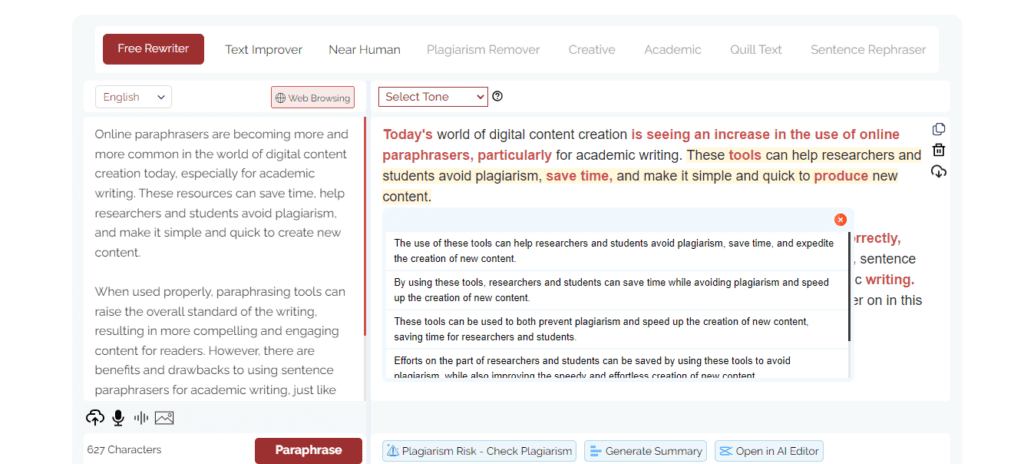Paraphrasing Tools for Academic Writing – 10+ Pros & Cons

In today’s digital era of content creation, where academic writing holds significant importance, online paraphrasers have gained immense popularity. These handy tools serve as a time-saving solution for students and researchers, allowing them to effortlessly generate new content while avoiding plagiarism.
When utilized correctly, paraphrasing tools not only enhance the overall quality of writing but also captivate and engage readers on a deeper level. By presenting information in a fresh and unique manner, these tools help to create more compelling and persuasive academic pieces. Tip – most of the AI writers are also good paraphrasing tools.
However, like any tool, sentence paraphrasers for academic writing come with their own set of advantages and disadvantages. In this comprehensive article, we will delve into the intricacies of these pros and cons, shedding light on their impact and guiding writers towards informed decision-making.
Understanding Paraphrasing
Paraphrasing is a writing technique that involves expressing an author’s original ideas in your own unique words. Rather than simply quoting the original text verbatim, you interpret the message and write it anew, which requires a comprehensive understanding of the material.
Paraphrasing is widely used in academic writing, allowing students and researchers to integrate existing knowledge while maintaining the originality of their work. Effective paraphrasing ensures that the information is accurately conveyed, offering fresh insights, and enhancing the readability of the content. It’s important to note that while paraphrasing involves rephrasing, it is essential to credit the original author to avoid plagiarism.
The Pros of Using Paraphrasing Tools for Academic Writing:
Time-Saving: One of the biggest advantages of using the paraphrasing tool is that it can save a significant amount of time. Rather than spending hours rewriting content manually, a student or researcher can simply input their existing content into a paraphrase online and receive a new, rephrased version almost instantly.
Zero Plagiarism, Zero Effort
Another major benefit of using a paraphrasing tool is that it can help to avoid unintentional plagiarism. By rephrasing existing content in a new way, the tool ensures that the new content is original and free from plagiarism.
is an essential aid for writers who need to produce plagiarism-free content quickly. This tool works by changing the original wording of a piece of text while retaining the same meaning, resulting in a new version that passes plagiarism checks.

It saves time by automating the process of finding synonyms and rephrasing sentences, allowing writers to focus on other aspects of their work. Additionally, paraphrasing tools can be customized to suit different writing styles, tones, and purposes, making them useful for various writing tasks.
For example, paraphrasingtool.ai is one of the best-known rewriting tools among students and researchers for academic writing. The content generated by this amazingly faster tool will always be 100% unique and plagiarism-free.
Create New Content every time
A paraphrasing tool can create new content for academic writing every time by using advanced algorithms to replace words and phrases with synonyms and alternative sentence structures. By analyzing the context of the original text and understanding its meaning, the tool can generate unique and plagiarism-free content that conveys the same message as the original but in different words.

Furthermore, these tools often have vast databases of synonyms and related words, allowing them to generate a wide range of possible paraphrases for any given sentence or phrase. This process can be repeated as many times as needed until the desired level of originality is achieved. In academic writing, where originality is crucial, a paraphrasing tool can be a useful tool for generating new content while avoiding plagiarism.
It can help students and researchers to create new content quickly and easily. By rephrasing existing content, a writer can generate new articles, research papers, and other types of academic writing without having to start from scratch.
Some AI writers also do this, but the ones specializing in paraphrasing do it even better.
Enhances Productivity & Readability
AI paraphrasing online can enhance productivity and reliability for academic writers by streamlining the process of generating unique and original content. With the ability to quickly replace words and phrases, writers can save time and focus on other aspects of their work, such as research and analysis.
Additionally, by producing multiple versions of a sentence or paragraph, rewriting tool free can help writers to find the most effective way to convey their ideas, leading to a more coherent and well-structured document.
The use of an AI tool to rephrase sentences can help to ensure the reliability of the work by preventing plagiarism and maintaining academic integrity.
Time Efficiency
Another significant advantage of using paraphrase online tools for academic writing is the time efficiency they offer. Writing a research paper or an essay often requires extensive reading and understanding of various sources.
Paraphrasing tools can save a considerable amount of time by automatically rephrasing the original text while retaining the essential meaning.
Instead of spending hours manually rewriting sentences, students and researchers can utilize these tools to quickly generate paraphrased content, allowing them to focus more on critical aspects of their work, such as analysis and synthesis.
Language Enhancement:
AI sentence rephrasers can also be beneficial in improving language skills, particularly for non-native English speakers. Academic writing often demands a high level of proficiency in English, including vocabulary, grammar, and sentence structure.
By using sentence paraphrasing online, students can gain exposure to different sentence constructions and learn new vocabulary, thereby enhancing their language skills.

Moreover, these tools can help individuals understand the nuances of sentence formation, ensuring that their writing adheres to academic standards. Over time, consistent use of paraphrase online can contribute to language development and foster improved writing abilities.
Improve Content Quality
In academic writing, the quality of content matters the most, and a good paraphrasing tool is one that can improve the quality of the content. By rephrasing sentences and paragraphs, the tool can help to improve the readability and flow of the writing, making it more engaging for the reader.
AI-powered rewriting tools can improve the content quality in academic writing by helping writers to avoid plagiarism and enhancing the overall coherence and readability of the text. When used correctly, the online paraphrase tool can help writers express complex ideas more clearly by rewording sentences and paragraphs in a way that is easier to understand.
Simplifying Complex Subjects/Assignments
Paraphrasing tools can be highly beneficial for academic writing as they contribute to the enhancement of understanding and comprehension of the original text.
When utilizing these tools, students are required to carefully analyze the content and extract the core meaning, enabling them to rephrase it in their own words.
This process helps students grasp complex concepts and ideas more effectively, as they need to fully comprehend the content before paraphrasing it. By engaging with the text at a deeper level, students can develop a stronger understanding of the subject matter and improve their overall knowledge.
Promoting Language Development and Vocabulary Expansion
A rephraser can also contribute to the development of language skills and vocabulary expansion. When students use these tools, they are exposed to various sentence structures and alternative ways of expressing ideas.
This exposure helps them improve their command of the language, enhances their writing skills, and expands their vocabulary.
By actively engaging with the paraphrasing process, students can learn new words, phrases, and synonyms, allowing them to articulate their ideas more precisely and eloquently.
Improves Student Confidence
By using paraphrasing tools, students can confidently integrate external information into their work while maintaining academic integrity. They are able to acknowledge and respect the intellectual property of others by accurately paraphrasing and citing sources.
This ethical approach to writing not only avoids plagiarism but also encourages students to develop a strong sense of academic honesty and integrity.
Encouraging Critical Thinking and Analysis
Another advantage of using a paraphrase tool in academic writing is that they foster critical thinking and analysis skills. When students rely solely on copying and pasting or directly quoting from a source, they often miss the opportunity to engage critically with the material.
However, paraphrasing requires students to think analytically about the content, evaluate its relevance, and determine how to express it in their own words.
The Cons of Using Paraphrasing Tools for Academic Writing
Despite the utility of paraphrasing tools in academic writing, an awareness of their drawbacks is crucial for writers. A notable concern lies in the potential for inaccuracies and grammatical errors, challenging the reliability of paraphrased content. The need for caution is emphasized, suggesting that while online rephrasers offer assistance, they should be judiciously integrated with other research and writing strategies to uphold the highest quality of work.
Accuracy Issues
A significant drawback surfaces in the form of accuracy issues. Paraphrasing tools, often powered by algorithms, may not consistently capture the intended meaning of the original content, introducing errors and inaccuracies in the rephrased material.
Loss of Personal Voice
The adoption of AI rewriting tools carries the risk of a diminished personal voice and writing style. This poses a disadvantage, particularly for students and researchers aiming to articulate their unique ideas and perspectives authentically.
Limited Vocabulary
Another potential limitation is the tool’s susceptibility to a confined vocabulary. This constraint can manifest in repetitive or redundant phrasing within the rephrased content, potentially affecting the richness and diversity of expression.
Limited Contextual Understanding
Paraphrasing tools may struggle with contextual nuances, particularly in technical or specialized content. The lack of contextual understanding can lead to inaccuracies or misinterpretations in the rephrased output, diminishing the tool’s effectiveness in such domains.
Dependence on Technology
A noteworthy concern revolves around the potential dependence on technology. The convenience and ease offered by paraphrasing tools may lead to a reliance that, over time, becomes habitual for students in academic writing. This dependence might impede the development of independent writing skills.
Conclusion
From today’s discussion about “The Pros and Cons of Using Paraphrasing Tools for Academic Writing”, it is concluded that “online sentence rephraser can be useful tools for academic writing, but they are not without their drawbacks.”
While they can save time, avoid plagiarism, and create new content quickly and easily, they may also result in accuracy issues, loss of personal voice, limited vocabulary, and a dependence on technology.
Students and researchers should weigh the pros and cons carefully before deciding whether or not to use a word paraphraser for their academic writing.
Frequently Asked Questions about Paraphrasing Tools
- How does a paraphrasing tool work? A paraphrasing tool uses advanced algorithms and databases to identify words and phrases in the original text and replace them with synonyms or alternative sentence structures.
- Are there any free online paraphrasing tools available? Yes, there are many free online paraphrasing tools available, but they may have limitations such as word count restrictions or accuracy issues.
- Can I trust the accuracy of a paraphrasing tool? While some paraphrasing tools may provide accurate results, they should not be solely relied upon for important academic writing tasks. It is always recommended to proofread and edit the final paraphrased content.
- Is it ethical to use a paraphrasing tool for academic writing? It is not unethical to use a paraphrasing tool, as long as the original source is properly cited and the content is not plagiarized. However, it is important to ensure that the final paraphrased content does not misrepresent the ideas or research of others.
- Are there any alternatives to using a paraphrasing tool for academic writing? Yes, there are alternative methods for paraphrasing such as reading and understanding the original text thoroughly, taking notes, and then rewriting the content in your own words. Another option is to consult with a writing tutor or colleague for feedback and suggestions on how to effectively paraphrase.
- Can a paraphrasing tool improve my writing skills? While using a paraphrasing tool may help with time management and provide alternative sentence structures, it is not a substitute for developing strong writing skills. It is important to continue practicing and learning how to effectively paraphrase in your own words.
- How can I ensure my paraphrased content is not plagiarized? To avoid plagiarism, it is important to properly cite the original source and use a variety of synonyms and sentence structures when paraphrasing. It is also helpful to compare the original source with your paraphrased content to ensure it accurately reflects the ideas and research of others.
- What should I do if I am unsure about whether my paraphrased content is accurate? If you are unsure about the accuracy of your paraphrased content, it is recommended to seek feedback from a writing tutor or colleague. You can also compare your paraphrased content with the original source to ensure it aligns with the main ideas and information presented.
- Is it ethical to use a paraphrasing tool for academic writing? As long as the original source is properly cited and the content is not plagiarized, using a paraphrasing tool can be considered ethical. However, it is important to use these tools as a supplement and not rely solely on them for academic writing.
- How can I improve my paraphrasing skills? The key to improving your paraphrasing skills is practice. It is helpful to read and analyze various sources, then try rewriting them in your own words. You can also consult with a writing tutor or take a writing course to learn specific techniques and strategies for effective paraphrasing. Additionally, expanding your vocabulary and knowledge of synonyms can also aid in producing well-written paraphrased content. Overall, the more you practice and receive feedback, the better you will become at accurately and effectively paraphrasing.
- What are some common mistakes to avoid when paraphrasing? Some common mistakes to avoid when paraphrasing include copying whole phrases or sentences without proper citation, failing to change the sentence structure or wording enough, and using synonyms that do not accurately convey the same meaning as the original source. It is also important to properly cite all sources used in your paraphrased content.
- Can I use quotations while paraphrasing? Yes, it is acceptable to use quotations while paraphrasing as long as they are used sparingly and properly cited. Quotations should only be used when the original wording is essential or cannot be accurately paraphrased. It is important to use your own words as much as possible in order to demonstrate your understanding of the source material.
- How can I make sure my paraphrasing is accurate and reliable? To ensure accuracy and reliability in your paraphrased content, it is important to carefully read and understand the original source material before attempting to rephrase it. It can also be helpful to compare your paraphrased version with the original source to ensure that you have captured its main ideas and key points. Additionally, seeking feedback from a writing tutor, teacher, or peer can also help identify areas for improvement in your paraphrasing skills.
- What are some strategies for effectively paraphrasing? Some effective strategies for paraphrasing include changing the sentence structure and word order, substituting synonyms for key terms, and condensing longer passages into shorter ones while still retaining the main ideas. It is also important to use your own writing style and voice in the paraphrased content, rather than simply copying the structure or tone of the original source.
- Why is it important to properly cite sources when paraphrasing? Properly citing sources when paraphrasing is crucial as it gives credit to the original author and demonstrates academic integrity. It also allows readers to access the original source for further reading or verification. Failing to cite sources can result in accusations of plagiarism, which can have serious consequences in academia and beyond.
- In what situations should I use quotations instead of paraphrasing? Quotations should only be used when the original wording is essential to convey a specific point or argument, or if it is difficult to accurately paraphrase the content.
If you liked this, the following might interest you.
AI Writers: Copymatic, Quillbot, Peppertype, Jasper AI (pricing) & more
Careers: Managing managers
Work From Home tools: Jabra
You can also follow the author here.




